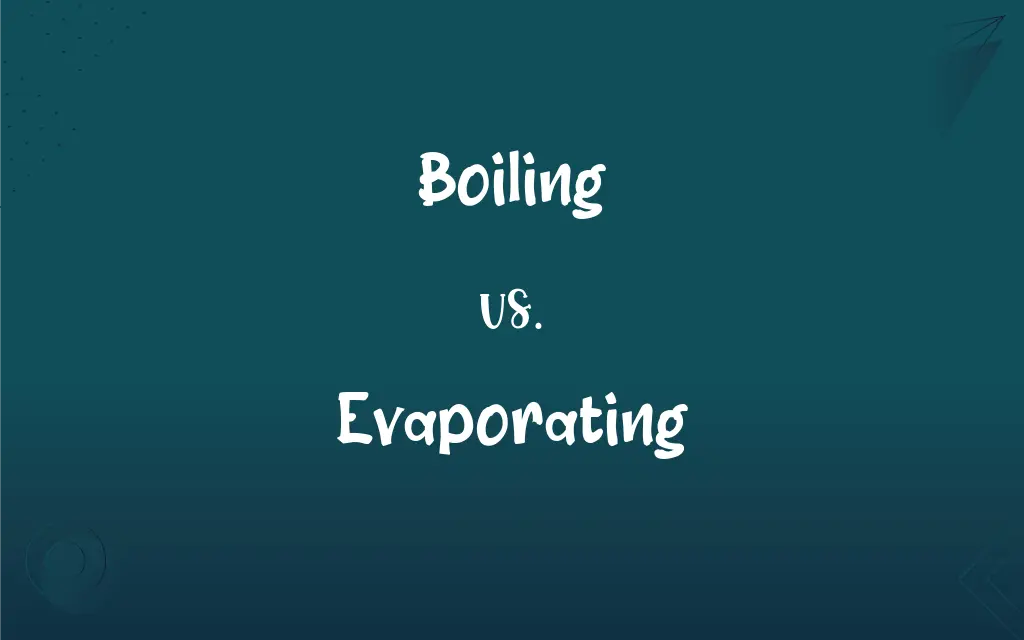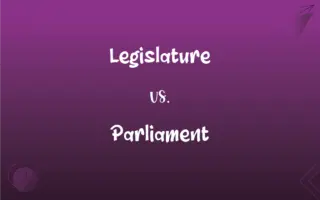Boiling vs. Evaporating: What's the Difference?
Edited by Harlon Moss || By Janet White || Published on November 9, 2023
Boiling is the rapid vaporization of a liquid when it's heated to its boiling point; evaporating is a gradual process where a liquid turns into vapor at temperatures below its boiling point.

Key Differences
Boiling is a phase transition that a substance undergoes when it reaches a specific temperature, known as its boiling point, where the liquid turns into vapor or gas. During this process, bubbles form within the liquid and rise to the surface as the entire liquid is at its boiling point. Conversely, evaporating is a surface phenomenon that can occur at any temperature below the boiling point of a liquid. Only molecules with enough kinetic energy from the surface of the liquid become vapor during evaporation.
The process of boiling often requires an external heat source to maintain the temperature and continue the phase transition. For example, water boils at 212°F (100°C) under standard atmospheric pressure, and we observe rigorous bubbling when this happens. In contrast, evaporating can occur without any external heat source. We see evaporation in action when a puddle of water dries up on a sunny day or even when clothes dry at room temperature.
In boiling, the vaporization happens throughout the entire volume of the liquid. This is why when water is boiling, we see bubbles forming everywhere, not just on the surface. With evaporating, the transformation from liquid to vapor only takes place at the surface of the liquid. This is why, when water in a bowl is left exposed to air, the water level goes down gradually without any visible bubbling.
It's crucial to note that both boiling and evaporating are natural processes by which a substance turns from its liquid phase to its gaseous phase. However, boiling is more aggressive and requires the liquid to reach a particular temperature, whereas evaporation is gentler and can occur over a range of temperatures below the boiling point.
Comparison Chart
Definition
Rapid vaporization at boiling point
Gradual vaporization below boiling point
ADVERTISEMENT
Occurrence
Throughout the liquid
At the liquid's surface
Temperature
At boiling point
Below boiling point
Heat Source
Often requires external source
Can occur without an external source
Visible Indicator
Bubbles forming in the liquid
Liquid level decreases over time
Boiling and Evaporating Definitions
Boiling
Characterized by the formation of bubbles in a liquid due to heat.
The boiling pot overflowed onto the stove.
ADVERTISEMENT
Evaporating
The process of concentrating a substance by evaporating off its solvent.
The salt was obtained through the evaporating process.
Boiling
The act of cooking something by boiling it.
The boiling of the vegetables took about ten minutes.
Evaporating
To extract moisture from a substance.
The machine is used for evaporating milk to make powdered form.
Boiling
Extremely hot in temperature.
The boiling sun made the day unbearable.
Evaporating
The process by which a substance transforms from its liquid state to a gaseous state.
The evaporating water left behind a residue.
Boiling
Expressing great agitation or excitement.
The crowd was boiling with enthusiasm.
Evaporating
The act of disappearing or vanishing.
The hopes of winning were quickly evaporating.
Boiling
Heated to or past the boiling point
A kettle of boiling water.
Evaporating
Dissipating or dispersing like vapor.
The morning mist was evaporating as the sun rose.
Boiling
Very angry or upset; seething.
Evaporating
To convert or change into a vapor.
Boiling
Used as an intensive
Fainted because it was boiling hot.
Boiling mad over the mistake.
Evaporating
To draw off in the form of vapor.
Boiling
Present participle of boil
Evaporating
To draw moisture from, as by heating, leaving only the dry solid portion.
Boiling
The process of changing the state of a substance from liquid to gas by heating it to its boiling point.
Evaporating
To deposit (a metal) on a substrate by vacuum sublimation.
Boiling
(uncountable) An animation style with constantly changing wavy outlines, giving a shimmering or wobbling appearance.
Evaporating
To change into vapor.
Boiling
That boils or boil.
Boiling kettle
Boiling oil
Evaporating
To pass off in or as vapor.
Boiling
Of a thing: extremely hot or active.
The radiator is boiling – I’m going to turn it down a bit.
Evaporating
To produce vapor.
Boiling
Of a person: feeling uncomfortably hot.
I’m boiling – can’t we open a window?
Evaporating
To disappear; vanish
Our fears at last evaporated.
Boiling
Of the weather: very hot.
It’s boiling out today!
Evaporating
Infl of evaporate
Boiling
(of adjectives associated with heat) Extremely
He was boiling mad.
Boiling
Heated to the point of bubbling; heaving with bubbles; in tumultuous agitation, as boiling liquid; surging; seething; swelling with heat, ardor, or passion.
Boiling
The act of ebullition or of tumultuous agitation.
Boiling
Exposure to the action of a hot liquid.
Boiling
The application of heat to change something from a liquid to a gas
Boiling
Cooking in a boiling liquid
Boiling
Extremely;
Boiling mad
Boiling
The process by which a liquid turns into vapor when it reaches its boiling point.
The boiling of water produces steam.
FAQs
Is boiling a cooling process?
Boiling requires energy (heat), but the liquid cools as it loses molecules to vaporization.
Do all liquids have the same boiling point?
No, different liquids have different boiling points based on their unique properties.
Why does my cup of water disappear if I leave it out for days?
The water in the cup undergoes evaporation, turning into vapor.
Why do I see steam when water is boiling?
Steam is the water vapor produced due to the boiling process.
What causes a liquid to boil?
A liquid boils when it reaches a temperature where its vapor pressure equals the external pressure.
Is evaporation a type of vaporization?
Yes, evaporation is a type of vaporization that occurs on the surface of a liquid.
Why does a puddle disappear over time?
A puddle disappears due to the evaporation of the water.
Can evaporation occur in the shade?
Yes, evaporation can occur in the shade, although it might be slower than in direct sunlight.
Does evaporation only happen in liquids?
Primarily, but solids can sublimate directly into a gas without becoming liquid.
Does evaporation cause cooling?
Yes, evaporation causes cooling as the surface loses its highest energy molecules.
Does saltwater evaporate?
Yes, but the salt remains behind after the water has evaporated.
Can boiling occur without heating?
Boiling can occur without external heating if the pressure around the liquid is reduced.
Why do I see bubbles when water is boiling?
Bubbles are formed by the rapid formation of water vapor due to boiling.
Do all substances evaporate?
Most substances can evaporate under the right conditions, but the rates vary.
What's the boiling point of alcohol?
Ethanol, a common type of alcohol, boils at around 173.1°F (78.37°C).
Does increasing the temperature always increase evaporation rate?
Generally, yes; a higher temperature gives molecules more energy to evaporate.
Why does soup become thicker after boiling for a long time?
As water boils off in the form of steam, the remaining ingredients become more concentrated.
What factors affect the rate of evaporation?
Temperature, surface area, humidity, wind speed, and pressure affect evaporation rate.
At what temperature does water boil?
Water boils at 212°F (100°C) at standard atmospheric pressure.
Is boiling an endothermic or exothermic process?
Boiling is an endothermic process; it absorbs heat.
About Author
Written by
Janet WhiteJanet White has been an esteemed writer and blogger for Difference Wiki. Holding a Master's degree in Science and Medical Journalism from the prestigious Boston University, she has consistently demonstrated her expertise and passion for her field. When she's not immersed in her work, Janet relishes her time exercising, delving into a good book, and cherishing moments with friends and family.
Edited by
Harlon MossHarlon is a seasoned quality moderator and accomplished content writer for Difference Wiki. An alumnus of the prestigious University of California, he earned his degree in Computer Science. Leveraging his academic background, Harlon brings a meticulous and informed perspective to his work, ensuring content accuracy and excellence.
































































